Nowadays, a lot of people, especially children, love watching videos on YouTube, whether for educational purposes or for leisure. Although there is no doubt that YouTube serves as a source of worldwide information, it also comes with risks. That is why parental guidance is very crucial to ensure a safe digital environment on YouTube for kids.
In this article, we’ll explore the best safe YouTube alternatives for the year 2025. Moreover, we’ll also discuss different methods for safely setting up YouTube for kids with parental supervision, along with effective strategies to enhance your child’s YouTube safety. So, continue reading!
Why do kids need safe YouTube alternatives?
You might consider that YouTube is really safe for children. This is because you might be thinking that its built-in parental controls do the job. However, even with the most stringent limits, your children may be repeatedly exposed to harmful content. Let us analyse closely and understand together why kids need safe YouTube alternatives!
- Not every video is age-appropriate: Even with the best content filters in place, YouTube can still suggest violent, fearful, adult mockery, or stereotype-laden videos to kids.
- Addiction and screen time: Moreover, YouTube doesn’t provide enough control over kids’ screen time. Thus, too much screen time can result in addiction, which impacts children’s sleep quality, concentration levels, and their emotional well-being.
At what age can a child use YouTube?
According to YouTube’s policies, users must be at least 13 years old to create an account. This policy helps safeguard young children and complies with legislation that protects minors online.
YouTube does have an age verification. When signing up, users are required to enter their date of birth, which verifies their age. In some cases, YouTube may request an ID or credit card to verify the account holder’s age, especially for accessing age-restricted content or monetization features.
Furthermore, for children under 13, YouTube offers the YouTube Kids app, and parents can also set up supervised YouTube accounts linked to Google accounts. It creates a more controlled environment with curated, age-appropriate content.
Control the screen, pick the best platform for kids, and safe watching starts with you.
How to set up a YouTube for kids?
Your child’s safety on the internet, especially while using YouTube, is paramount. This tutorial will walk you through different ways to best set up YouTube for children.
On YouTube
- Step 1. Open your YouTube profile.
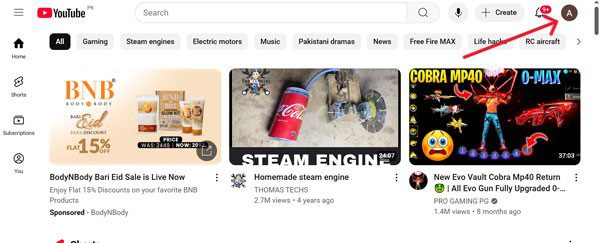


- Step 2. Open Settings > Account > Family Center.
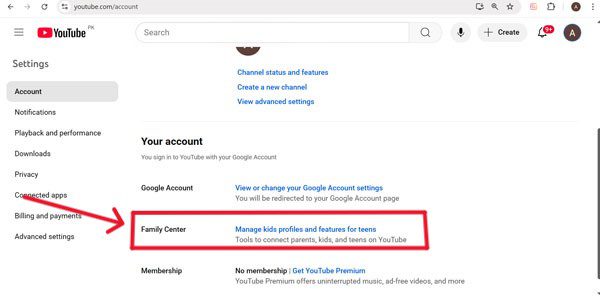


- Step 3. It will prompt Add Family Members, choose Add a YouTube Kids Profile.
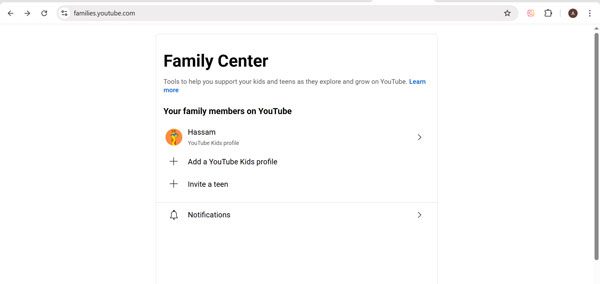


- Step 4. Input your kid’s data to create a profile.
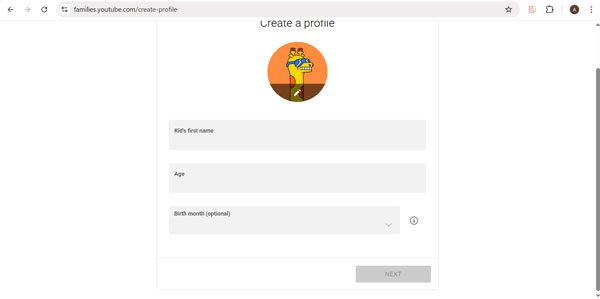


- Step 5. Now, you should allow or disallow some options according to your wishes. Select your Kids profile, and you can change setting options.
On YouTube Kids
- Step 1. Open YouTube Kids on your device. Sign up and choose “I’M A Parent.”
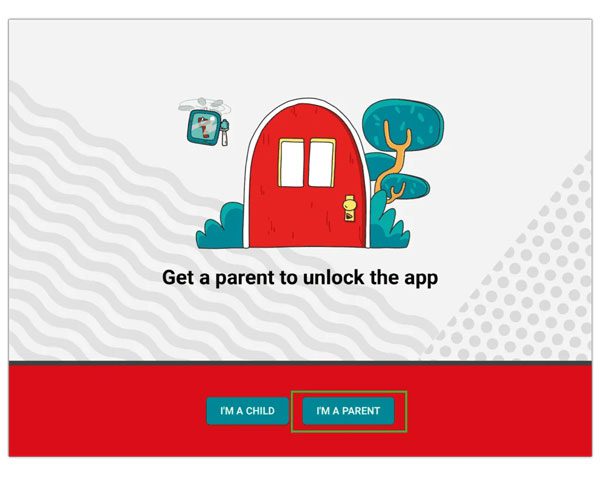


- Step 2. Follow the on-screen instructions like your age confirmation, sign in with Google, add or create your kid’s profile.
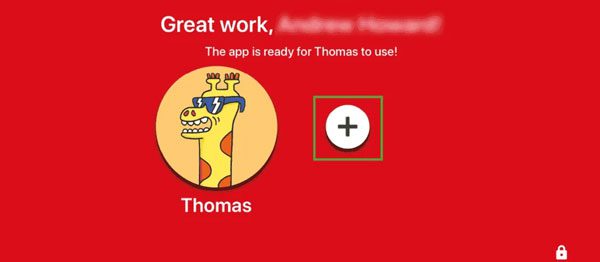


Now, you can adjust YouTube Kids settings for your kids to use as following:
Set up Passcode
1. Back to the home page and click on the lock icon at the bottom right corner.
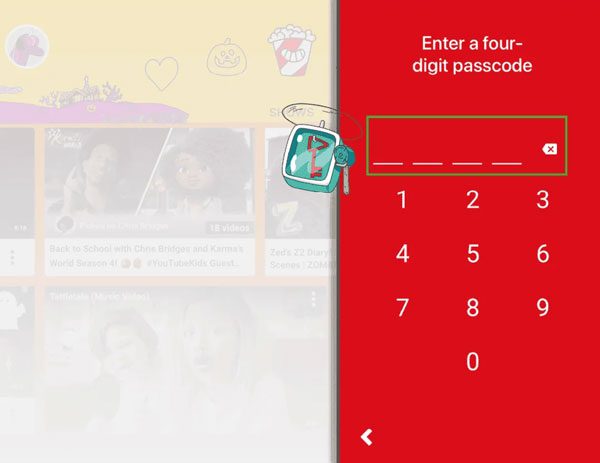


2. From the passcode prompt, you need to answer a math question to access. Here, add a four-digit passcode, and only you will be able to change the settings.
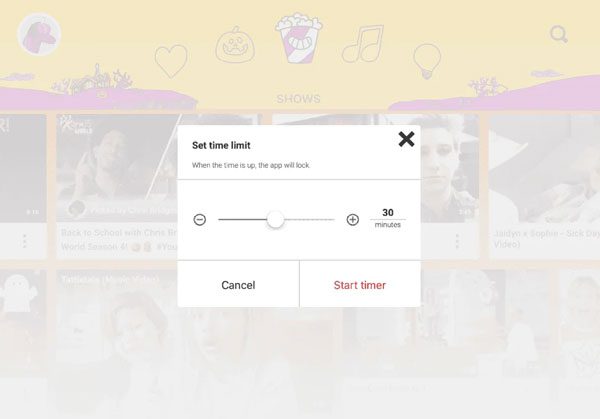


Setting time limits
- Choose the kids’ profile and click the lock icon in the bottom right corner.
- Enter your passcode. Click on the Timer icon.
- Set the limit, hit “Start Timer”.
YouTube Kids offers additional features, including the ability to turn off the search option, adjust the age parameters, and clear the history, so that certain types of videos are not displayed later on.
On Google Family Link
With Google Family Link, parents can manage their children’s Google Accounts together with services linked to it, such as YouTube.
- Step 1. Download and install the Google Family Link on your and your kid’s phones.
- Step 2. From the child’s Android phone, go to Settings > Google > All services > Parental controls. If your child’s device is already associated with a Google account, tap the name > All services > Parental controls.
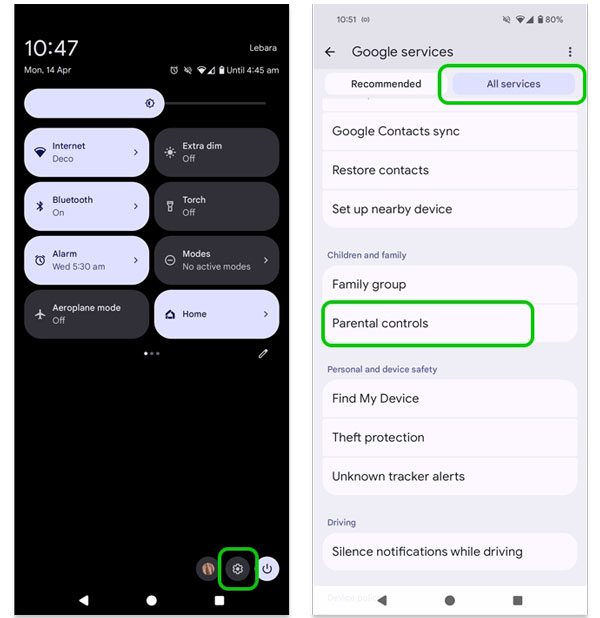


- Step 3. Launch your Family Link and click Add child.
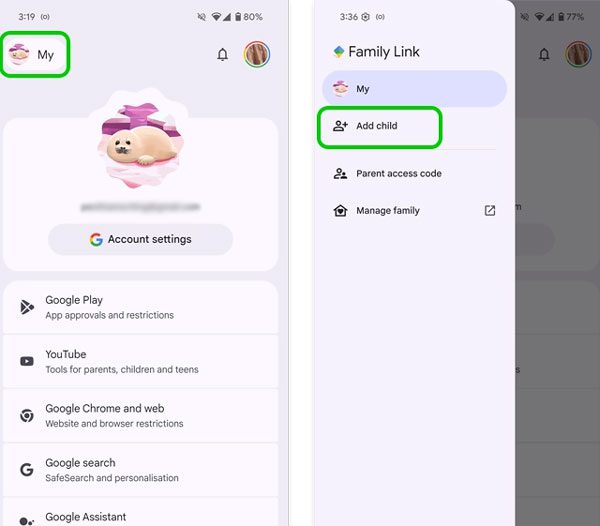


- Step 4. You will be asked if your kid has a Google account. If no, and you will be guided to the section where additional details should be filled in.
- Step 5. Follow the instructions to successfully set up your child’s profile, allowing you to manage kid’s YouTube access. After the setup, you can edit the following settings:
Daily screen time limit:
Access for certain apps. YouTube and other Google services tied to the account will have them placed under policies restricting access.
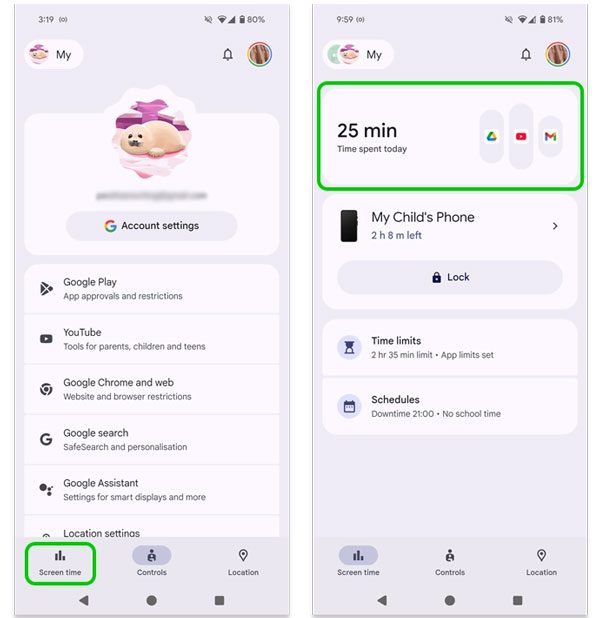


Content restriction on YouTube:
- Through the Family Link application, tap your child’s account.
- Navigate to “Manage Settings” > More > YouTube Kids (if it is installed on their device).
- Then, tap “Content level” and select “Younger” or “Older”.
For more information, refer to Google’s documentation on enforcing parental supervision restrictions.
The 5 best kid-friendly YouTube alternatives
Are you looking for an entertaining and safe place for kids to watch videos? Well! Here we are going to explore five amazing platforms that provide a safer environment for kids to navigate through various shows and movies. While also making it easier for parents to manage their children’s viewing habits.
1. PBS Kids
PBS Kids is a free educational platform that offers entertaining and informative shows. You can learn about different animals, science topics, and friendship from your favourite characters like Curious George and Sesame Street.
Supported devices:
Roku, Apple TV, Amazon Fire TV and Fire Stick, Android and iOS devices, Chromecast, Samsung Smart TVs (2017 and later), VIZIO SmartCast TVs.
Standout features:
- Full episodes of popular PBS Kids shows
- No login or subscription needed
- New videos are added often
- Child-friendly browsing experience
Pros:
- Completely free to use
- High-quality, educational content
- No ads or in-app purchases
Cons:
- Only PBS Kids shows are available
- Sometimes new episodes come later
2. Netflix Kids
Netflix Kids is a special part of Netflix made for kids with age-appropriate shows and movies. Your parents can control what you watch by setting limits and blocking certain titles.
Supported devices:
Mobile Phones and Tablets (Android and iOS), Smart TVs (Roku, Apple TV, Samsung, LG, Vizio), Gaming Consoles (PlayStation and Xbox), Streaming Devices (Chromecast, Amazon Fire TV), and Web Browsers (Chrome, Safari, Firefox).
Standout features:
- Customised age-gated profiles for youths
- Content blocking through parental controls
- Show and movie downloads are available
- Vast selection of kids’ entertainment
Pros:
- An extensive catalogue of shows and movies
- Nice video quality
- Supports multiple family profiles
Cons:
- Paid subscription necessary
- Not all shows may fit all children
3. Disney+
Disney+ provides a spellbinding world of streaming with an extensive collection of Disney, Pixar, Marvel, Star Wars, and National Geographic titles. It’s perfect for anyone who likes classic and newer tales featuring beloved characters.
Supported devices:
Mobile Phones and Tablets (iOS and Android), Smart TVs (Samsung, LG, Vizio), Streaming Devices (Apple TV, Roku, Amazon Fire TV, Chromecast), Game Consoles (PlayStation, Xbox), Web Browsers (Chrome, Safari, Firefox)
Standout features:
- Extensive collection of family-friendly films and series.
- Children’s profiles with monitors age-appropriate content.
- Offline video downloads. Gapless playback for remote family viewing parties.
Pros:
- Diverse selection of cherished franchises
- Excellent video streaming quality
- Reasonably priced subscription tiers
Cons:
- Subscription required
- Some content is directed towards older children.
4. Kidoodle TV
Kidoodle provides movies and shows specially tailored for children aged 12 and under. The platform is entirely free and safe, offering a full library of videos categorised by age.
Supported devices:
Tablets and Smartphones (iOS and Android), Smart TVs (Roku, Apple TV, Amazon Fire TV) , Web Browsers, Game Consoles (PlayStation, Xbox)
Standout features:
- Age categorisation for videos.
- Time and content restrictions for parents.
- Profiles with avatars and customisation.
- A content library that is updated continuously.
Pros:
- Ad-free access
- Secure and child-friendly platform
Cons:
- Less extensive library compared to larger providers
- Must have an internet connection for streaming
5. Nick Jr.
Shows like PAW Patrol and Blue’s Clues, streamed on Nick Jr, make it a great platform for preschoolers. It offers live as well as on-demand shows, streams various games, and features videos.
Supported devices:
Smartphones and tablets (iOS and Android), Smart TVs (Roku, Apple TV, Amazon Fire TV), Streaming devices (Chromecast, Amazon Fire TV), Web browsers (Chrome, Safari, Firefox)
Standout features:
- Live and on-demand popular shows for preschool children
- Interactive puzzles, games and activities
Pros:
- Good streaming quality
- Learning through play ensures information retention
Cons:
- Full access may require a TV provider login.
- Limited age-appropriate content available
How to choose the right YouTube alternatives for your kids?
As any parent knows, there are specific considerations to bear in mind when choosing a video platform for the child.
Content richness and quality
Look for platforms that offer high-quality videos produced by trusted brands. Apps like PBS Kids and Khan Academy Kids focus on learning through play and storytelling, making screen time both fun and educational.
Children’s interests
There is a variety of children’s favourite pastimes. For example, some children will enjoy cartoons, while others prefer more intellectual programming, such as shows and even music videos. Selecting a platform aligned with the child’s interests will go a long way towards reinforcing positive behaviour and motivating learning.
Parental controls
Effective parental controls help provide restrictions on unsuitable videos and manage screen time to keep the child safe from both harmful content and overexposure.
Ad-free or kid-safe ads
Avoid platforms with intrusive or inappropriate advertising. Opt for services that are ad-free or feature only vetted, kid-safe ads to prevent accidental exposure to harmful content.
Extra protections for your kids’ online viewing experience
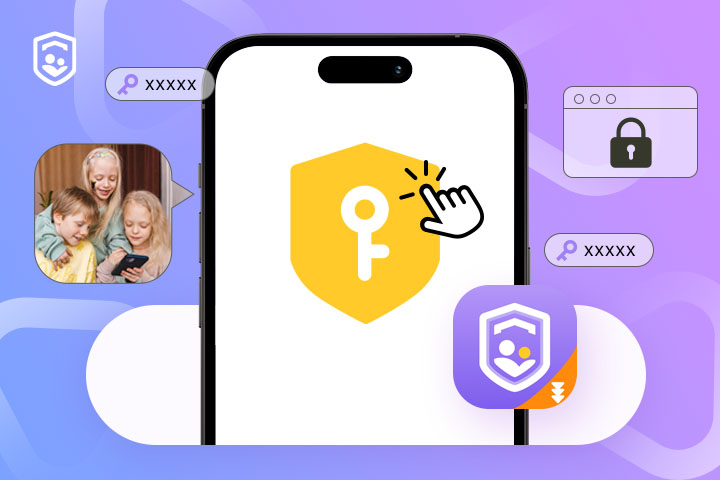


As a guardian, monitoring your child’s online video interests is a must. This helps you learn about their hobbies and ensures that they don’t get exposed to reckless or mature content. Thus, this engagement enhances their trust in you and shows that you care.
While fostering good online habits, setting parental control guidelines for the safety of the devices your child uses is also beneficial. For instance, setting watch limits and content restrictions helps internalise good habits, fostering a great balance between screen time, reading, and playing.
In some cases, these measures do not appear to be protective enough. Thus, third-party parental control apps like FlashGet Kids come in handy. This app quietly runs in the background, monitors the videos your child is allowed to access, and blocks inappropriate content to ensure age appropriateness.
Moreover, you can also sync the notifications, thus see what kind of videos your kids are suggesting. Thus, it ensures the digital security of your kids while still having fun.
Final thoughts
Considering everything above, I must say there is a need to configure YouTube specifically for children in order to provide them with a safe online context. However, looking for safer alternatives, such as PBS Kids, Netflix Kids, or Disney+, is also a must. These platforms enable you to control the information your child has access to and the concepts they learn through videos.
Thus, with the right tools and framed digital boundaries, you can ensure your child engages with technology in high spirits and embraces healthy routines every single day.
FAQs
It checks each video for unsafe words, hazardous themes, and explicit materials. Then, it attempts to block anything that may scare or confuse them.
YouTube Kids does allow some navigation controls to aid parents, which are meant to assist navigation. They can approve or disapprove of certain videos or channels, set time limits, and even blacklist content that they deem unsuitable for you.
Experts recommend a maximum of one to two hours per day. This allows plenty of time for outdoor activities, reading, or resting one’s eyes. Thus, it benefits their mental and physical health by getting away from the screen.
Certainly, parents can monitor their watch history via the YouTube Kids app. This helps them understand the type of videos you enjoy and ensures that you are not exposed to inappropriate content.

